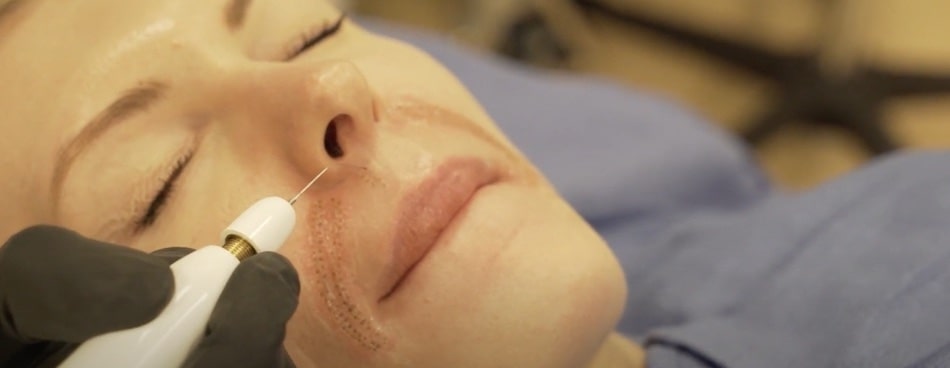
There is a new minimally invasive skin rejuvenating treatment that claims to replace neurotoxin injections, like Botox, and dermal fillers that create fullness in the skin. What is this new skin-tightening treatment called? Plasma Fibroblast Therapy, an energy-based skin therapy procedure that can eliminate superficial wrinkles and regenerate new and firmer skin.
This skin revitalizing procedure has even gone viral on TikTok, with its own trending hashtag #fibroblastplasma. But what exactly is plasma or even fibroblast? We break down all the details about the latest skin therapy treatment that is causing a buzz on social media.
Let’s start with the basics first. What is Plasma?
Plasma is ionized gas (not to be confused with plasma from blood used in PRP treatment). The gas is made up of positively charged ionized particles when energy charges through the gas. The combination of gas, oxygen, and energy creates a thermal reaction to the skin from the plasma current. The reactions result in minor wounds to the skin, causing the areas of the skin to tighten and induce the healing process.
Fibroblast is a type of cell found in the connective tissue below the skin’s surface. The fibroblast cells secrete collagen proteins that help the skin’s structure to be robust and firm. It also plays an essential role when healing wounds.
When plasma currents are aimed at the skin, the energy from the current stimulates the fibroblast cells to make more collagen proteins and helps speeds up the healing process of the wounds.
Plasma Fibroblast Therapy is a minimally invasive procedure that uses a handheld device with a metal probe tip that transfers energy to the skin. The energy from the device and the air between the applicator tip generates a plasma current. The only way the energy is transferred to the skin is when the tip is about 0.5 mm away from the skin’s surface, meaning the tip doesn’t contact the skin. The plasma current creates a controlled thermal reaction called plasma points, which look like tiny brown pinhead marks on the skin.
The micro-current of plasma energy creates tiny wounds to the epidermis (top layer) of the skin, causing the area to tighten and initiates the skin to begin the healing process. However, the treatment doesn’t stop there. The plasma energy continues to penetrate the dermis (middle) layer of skin to activate the fibroblast cells for new skin regeneration and reduces the appearance of wrinkles with new supple and vibrant skin.
Plasma Fibroblast to the face can help treat the following:
Although Plasma Fibroblast treatments for the face are non-surgical, there are plasma pens available to use at home. However, it is recommended to have this therapy performed by a board-certified dermatologist or cosmetic surgeon. At-home treatments have a high risk of creating scars rather than wounds when performed by an untrained individual. Also, at-home plasma pens are not regulated by the FDA.
Plasma IQ is one of two branded plasma energy devices that are FDA-cleared for the use in dermatologists or cosmetic surgeons’ offices to rejuvenate the skin safely and effectively.
Here is a video that breakdowns a Plasma IQ treatment with Dr. Sameer Bashey.
A Plasma Fibroblast procedure is considered an outpatient doctor’s visit that can take 60-90 minutes to complete.
Here is a general step-by-step walkthrough of a Plasma Fibroblast treatment:
Typically, patients only need one treatment to achieve their desired results. But the number of procedures required will depend on the skin’s condition and how wide an area is being treated.
Immediately after the procedure, you’ll see a pattern of dots on your face that are scab-like but do not pick at them or wash them off. The tiny scabs will naturally fall off the skin within seven days of the treatment. Patients are also recommended not to apply any make-up or expose the skin to the sun for at least 1-2 weeks post-procedure as the skin is healing.
The final results of a Plasma Fibroblast treatment will take 12-18 weeks for the collagen to produce and fully develop. However, noticeable results will appear 2-3 weeks after the treatment with tighter and firmer skin.
With any surgical or cosmetic procedure, they can’t stop the skin from aging and can’t produce permanent results. But a plasma energy treatment can help slow down the aging process with results that last for 3-5 years, if not more, depending on the individual skincare routine and lifestyle.
We can understand why this non-surgical skin-tightening treatment has risen in popularity on social media with its innovative use of plasma energy therapy. A Plasma Fibroblast treatment not only helps resurfaces the top layer of the skin but restructures the deepest layers to form supple and smoother skin.
But to achieve tighter and firmer skin for your face safely, it is recommended to work with a highly trained board-certified dermatologist or cosmetic surgeon to perform this treatment on your skin. The risks of doing a plasma energy treatment on your own are too high to take on.
Find a board-certified cosmetic practitioner or dermatologist trained in your area with our "Find a Doctor" navigation tool.
- VM